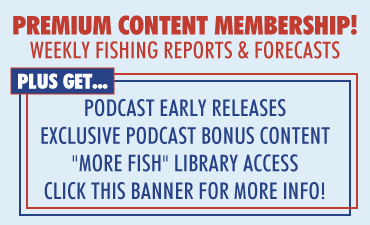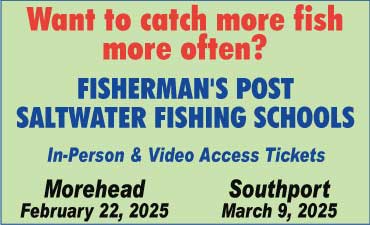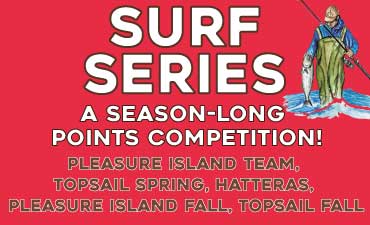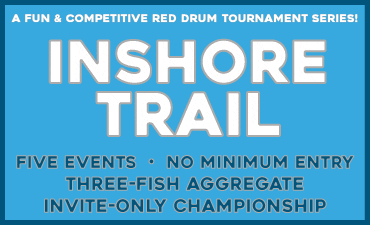Releases – July 28, 2011
The N.C. Marine Fisheries Commission will meet Aug. 10-12 at the Holiday Inn Brownstone, 1707 Hillsborough St., Raleigh.
The meeting is open to the public.
The commission plans to review public input received about allowing an Atlantic Ocean striped bass commercial hook-and-line fishery. The commission is also slated to decide how it wants to manage the ocean striped bass fishery for the upcoming season.
The N.C. Division of Marine Fisheries held five meetings in different regions of the coast and in Raleigh to receive public comment on this idea. The commission directed the division to examine a commercial hook-and-line fishery for ocean-caught striped bass to help avoid waste after reviewing incidents of dead discards of striped bass in the ocean trawl fishery this winter.
Also scheduled is a review of management options for ending overfishing within two years of adoption of the Spotted Seatrout Fishery Management Plan. The commission will be asked to vote to send these options out for public input.
A new law passed last year requires all fishery management plans to end overfishing within two years of final adoption. A draft Spotted Seatrout Fishery Management Plan that was developed prior to passage of the law and tentatively approved in November does not meet this criteria.
Other agenda items include review of a draft amendment to the Estuarine Striped Bass Fishery Management Plan and review of a new stock assessment for blue crab.
The meeting begins with a public comment session at 6:00 p.m. on Aug. 10. Anyone who wishes to speak to the commission on a fisheries-related matter may do so then or at 9:15 a.m. on Aug. 11. Due to time constraints, the commission chairman asks individuals to speak only once, either on Aug. 10 or on Aug. 11, but not during both public comment periods.
The business session of the meeting begins at 9:00 a.m. on Aug. 11 and 8:30 a.m. on Aug. 12.
After the success of SeaTow’s pilot Automated Radio Check (ARC) program at Wrightsville Beach last year, the service has gone national. Boaters all over the coastal United States now have the ARC option, freeing channel 16 for the emergency and hailing purposes it was originally designed.
The program has been operating on U.S. Channel 28, but Wrightsville’s channel has now changed to 26. Additional sites operate on channel 27. They include Carolina Beach, Ocean Isle, Morehead City, and Surf City, so boaters all over the region can now use the system.
Boaters who haven’t tried the ARC system need only make sure their radios are set to U.S. and not International, select the appropriate channel for the area, key the mic, and speak clearly into it. A pre-recorded message will identify the site responding, and then transmit a recording of whatever has been said over the mic.
Hearing the playback of their transmissions lets boaters determine whether or not their radios are loud and clear before they head offshore. Any questions about the system should be directed to local SeaTow offices.
In 2010, CCA-NC led the fight for the passage of S.L. 2010-13, an act to improve the success of Fishery Management Plans in North Carolina. However, soon after the opening of the 2011 legislation session, members of the Joint Legislative Commission on Seafood and Aquaculture introduced HB 136. This bill would have exempted the Fishery Management Plan for spotted sea trout from the requirements of S.L. 2010-13.
CCA-NC members immediately mobilized and lobbied the members of the House Committee on Agriculture against this harmful bill. House leaders then announced that no action would be taken on HB 136 and, thus, the spotted sea trout FMP will be subject to the new rules.
The Joint Legislative Commission on Seafood and Aquaculture has often been a difficult obstacle to overcome as CCA-NC has sought meaningful fisheries reform. The fact that public members of the JLCSA included the lobbyist for the NC Fisheries Association often led to legislative recommendations such as HB 136 that were harmful to the resource.
Thus, CCA-NC supported HB 595, a bill to reorganize the Joint Legislative Oversight Commission. HB 595 abolished the Joint Legislative Commission on Seafood and Aquaculture and transferred its responsibilities to the Joint Legislative Commission on Governmental Operations. The membership of this commission is limited exclusively to legislators. Governor Perdue signed HB 595 into law on June 24.
The centerpiece of CCA-NC’s legislative efforts this session was HB 353 (Designation of Coastal Game Fish). Early on, legislative leaders said that the bill would not be considered until after all of the budget negotiations and votes concluded. Unfortunately, the final vote on the budget veto override occurred just two days before the legislative session was set to adjourn. Thus, there was no time for action on the bill.
However, because CCA-NC members were so vocal and engaged this session, legislative leaders gave us assurances that the General Assembly will take up the game fish legislation when they return for the short session in May of 2012. The General Assembly also included a broad review of fisheries issues in the Studies Act of 2011. This bill created the Marine Fisheries Legislative Study Committee.
The Marine Fisheries Legislative Study Committee will study the following issues:
(1) The potential impact to both the State’s fisheries resources and the State’s economy related to the designation of Red Drum, Spotted Sea Trout, and Striped Bass as coastal game fish.
(2) Changes to the appointment process and qualification for membership on the North Carolina Marine Fisheries Commission.
(3) Creation of a hook and line commercial fishery.
(4) Elimination of the trawl boat fishery in North Carolina.
(5) Regulating placement of nets and other commercial fishing apparatus in coastal fishing waters.
(6) Entering into agreements regarding the delegation of law enforcement powers from the National Marine Fisheries Service over matters within the jurisdiction of the Service.
(7) Potential modification of the Fisheries Reform Act of 1997.
(8) Whether Marine Fisheries should be a division of the Coastal Resources Commission or the Wildlife Resources Commission.
The Marine Fisheries Legislative Study Committee will issue a report that includes findings, recommendations, and legislative proposals before the General Assembly reconvenes next May.
The N.C. Division of Marine Fisheries website has a new home. The division’s new homepage is at http://portal.ncdenr.org/web/mf/home. Those who go to the old homepages at www.ncfisheries.net and www.ncdmf.net will be redirected to the new site. The division is moving its homepage under the N.C. Department of Environment and Natural Resources website as part of an effort to consolidate the agency’s Internet presence. The division will complete the transition of its entire website in the coming months. In the meantime, some of the homepage links will continue to connect to pages on the old website.





